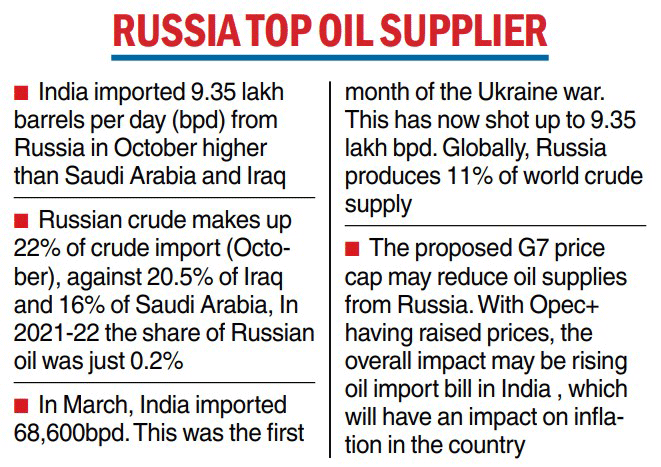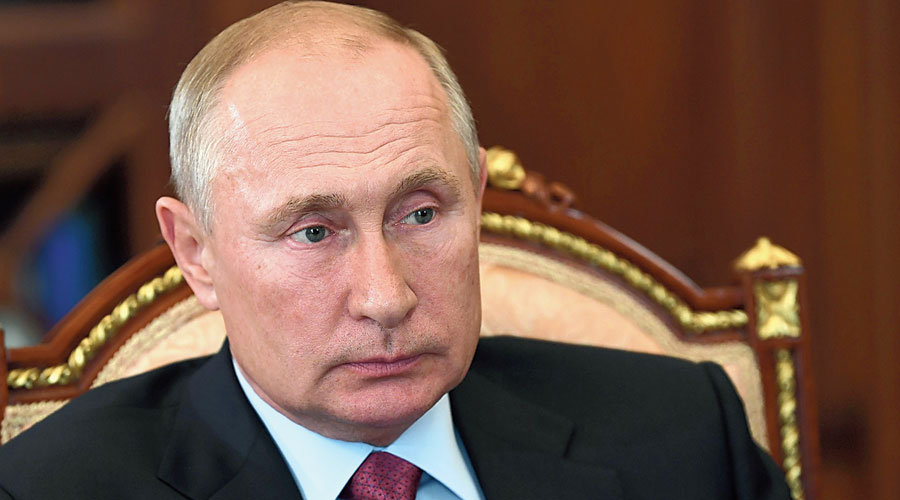Indian oil imports may take a hit from next month as the G7 price cap on Russian oil takes effect from December 5, which will also impact overall inflation.
Russia has become India’s top oil supplier in October, surpassing traditional sellers Saudi Arabia and Iraq, according to data from energy cargo tracker Vortexa.
New Delhi will wait till the G7 announces the details of the price cap even as analysts said little can be done to restrict the flow of Russian crude in the global oil market.
Oil minister Hardeep Singh Puri has said India will respond when the proposal is firmed up by the G7.
How Russia navigates the price cap would have larger global implications on crude prices, inflationary pressure on the economy and global economic growth.
The plan in the public domain states that the G7 have agreed to call for participating countries to deny Western-dominated services including insurance, finance, brokering and navigation to oil cargoes priced above the cap. The cap is yet to be decided but speculated to be in the $40-$60-per-barrel -range.
Russia, which made up for just 0.2 per cent of all oil imported by India in the year to March 31, 2022, supplied 935,556 barrels per day (bpd) of crude oil to India in October — the highest ever.
It now makes up for 22 per cent of India’s total crude imports, ahead of Iraq’s 20.5 per cent and Saudi Arabia’s 16 per cent.
India’s appetite for Russian oil swelled ever since it started trading on discount as the West shunned it to punish Moscow for its invasion of Ukraine.

The decision by OPEC+ — which includes the oil cartel Opec and Russia — to cut production and maintain prices at elevated levels was a matter of concern for the Indian government.
Data showed that during April to September Iraq was the top supplier of crude at $19.86 billion in terms of value, followed by Saudi Arabia, $16.86 billion and Russia, $14.07 billion.
Earlier, given the costs involved in transporting the fuel, Indian refiners were wary of buying Russian oil.
With the war in Ukraine, Moscow has come out with a crude discount which is attractive to domestic refiners.
There are questions whether the refiners would be able to sustain imports from Russia even after the G7 nations come out with the price cap from December 5.
Several analysts have questioned the sustainability of the cap or whether Russia can be stopped from entering the market.
Russia is the second largest producer of crude oil in the world. It produces over 11 per cent of the global total demand of approximately 100 million barrels per day. After the war in Ukraine started, Russia has been exporting about 7 million bpd. Russian export revenue from oil currently averages about $20 billion per month.
Analysts have estimated that if Russian oil supply of 6-8 million bpd is taken off the global market, prices would soar to $380 per barrel. Since hydrocarbons remain a major source of energy, any oil price above $200 would create political upheavals almost everywhere in the world. This clearly indicates why the G7 nations is pushing for a cap and not an outright ban on Russian oil.
Monitoring Russian oil is likely to be a difficult process. “If the G7 decided to toughen up its sanctions against Russian oil exports, Moscow and Tehran could agree to a swap deal of one sort or another that would see Russian oil go to anywhere that Iran needed it, with a compensatory amount of ‘Iraqi’ (read ‘Iranian’) oil going to wherever Russia wanted, as Iraq oil is not under any sanctions,” analysts at Oilprice.com said in a report.
With the G7 proposing a cap rather than an outright ban, analysts are trying to estimate Russian oil supplies with the cap.
Analysts fear the RussianIran-Iraq-China corridor particularly an alliance between Russia and Iran will beat the purpose of the cap.
Iran, in collusion with Russia and China, and using Iraq as a conduit, when necessary, had no choice but develop its own methods of circumventing sanctions since 1979, at which it has become adept, they said.
They pointed out that there are also shipping-related methods to circumvent sanctions: involving the disabling on the ‘‘automatic identification system’’ on ships that carry Russian oil as is just lying about destinations in shipping documentation.
India imported 68,600 bpd of Russian oil in March while it increased to 266,617 bpd in the following month and peaked to 942,694 bpd in June.
But in June, Iraq was India’s top supplier with 1.04million bpd of oil. Russia in that month became India’ssecond biggest supplier. Imports dipped marginally in the following two months.











